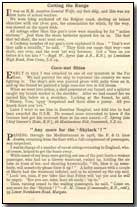Memoirs & Diaries - The Best 500 Cockney War Stories - Coco-nut Shies and Other Stories
 Published in London
in 1921, The Best 500 Cockney War Stories
comprised, in the words of its newspaper publisher (The London Evening
News) "a remembering and retelling of those war days when laughter
sometimes saved men's reason".
Published in London
in 1921, The Best 500 Cockney War Stories
comprised, in the words of its newspaper publisher (The London Evening
News) "a remembering and retelling of those war days when laughter
sometimes saved men's reason".
The collection of short memoirs, some 500 in total, is divided into five categories - Action, Lull, Hospital, High Seas and Here and There. This page contains five stories from High Seas, led by Coco-nut Shies.
Other sections within the collection can be accessed using the sidebar to the right.
Coco-nut Shies
Early in 1915 I was attached to one of our monitors in the Far East.
We had painted the ship to represent the country we were fighting in. The ship's side was painted green with palm trees on it, and up the funnel we painted a large coco-nut tree in full bloom.
When we went into action, a shell penetrated our funnel, and a splinter caught my breech worker in the shoulder. After we had ceased fire we carried him below on a stretcher.
Looking at the funnel, he said, "Blimey, Tom, 'appy 'Ampstead and three shies a penny. All you knock down you 'ave."
Later I went to see him in Zanzibar Hospital, and told him he had been awarded the D.S.M. He seemed more interested to know if the German had got his coco-nut than in his own award.
T. Spring (late Chief Gunner's Mate, R.N.), 26 Maidenstone Hill, Greenwich, S.E.10
"Any more for the 'Skylark'?"
Passing through the Mediterranean in 1916, the P. & O. liner Arabia, returning from the East with a full complement of passengers, was torpedoed.
I was in charge of a number of naval ratings returning to England, who, of course, helped to get the boats away.
While some of my boys were getting out one of the port boats a woman passenger, who had on a Gieves waistcoat, rushed up, holding the air tube in front of her, and shouting hysterically, "Oh, blow it up some-body, will somebody please blow it up?"
A hefty seaman with a couple of blasts had the waistcoat inflated, and as he screwed up the cap said, "Look 'ere, miss, if yer 'oller like that Fritzy will 'ear yer and he will be angry. 'Ere you are, miss, boat all ready; 'op in."
Then, turning round to the waiting passengers, he said, "Come on, any more for the 'Skylark'?"
F. M. Simon (Commander, R.N., retd.), 99 Lower Northdown Road, Margate
Still High and Dry
Whilst patrolling on an exceptionally dark night, the order being "No lights showing," we had the misfortune to come into collision with a torpedo boat.
Owing to the darkness and suddenness of the collision we could not discover the extent of the damage, so the officer of the watch made a "round," accompanied by the duty petty officer.
Upon reaching a hatchway leading down to the stokers' mess deck, he called down: "Is there any water coming in down there?"
In answer a Cockney stoker, who was one of a number in their hammocks, was heard to reply: "I don't fink so; it ain't reached my 'ammock yet."
J. Norton (late Ldg. Stoker, R.N.), 24 Lochaline Street, Hammer-smith, W.6
Trunkey Turk's Sarcasm
We were serving in a destroyer (H.M.S. Stour) in 1915, steaming up and down the East Coast. As we passed the different coastguard stations the bunting-tosser had to signal each station for news.
One station, in particular, always had more to tell than the others. One day this station signalled that a merchant ship had been torpedoed and that German submarines were near the coast.
My Cockney chum - we called him Trunkey Turk because of his big nose - asked the bunting-tosser for his news as he was coming down from the bridge, and when he was told, said, "Why didn't you ask them if they saw a tin of salmon in their tot of rum to-day?"
J. Tucknott, 2 Wisbeach Road, West Croydon
Running Down the Market
On board a destroyer in the North Sea in 1916. Look-out reports, "Sail ahead, sir." The captain, adjusting his glasses, was able to make out what at first appeared to be a harmless fisherman.
As we drew nearer we could see by her bow wave that she had something more than sails to help her along: she had power.
"Action Stations" was sounded, the telegraphs to engine-room clanged "Full speed ahead."
Our skipper was right. It was a German submarine, and as our foremost gun barked out we saw the white sails submerge.
Depth charges were dropped at every point where we altered course. Imagine our surprise to find the resulting flotsam and jetsam around us consisted of trestles, boards, paint-brushes, boxes, and a hat or two, which the crafty Germans had used to camouflage their upper structure.
The scene was summed up neatly by "Spikey" Merlin, A.B., a real product of Mile End Road: "Lor luv old Aggie Weston, we've run dahn the blinkin' Calerdonian Markit."
A. G. Reed (late R.N.), 15 William Street, Gravesend, Kent
Next - Five to One Against the "Tinfish" and four other stories
A "dope can" was a metal syringe containing petrol for priming an aircraft engine.
- Did you know?
